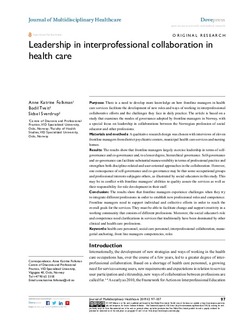| dc.contributor.author | Folkman, Anne Katrine | |
| dc.contributor.author | Tveit, Bodil | |
| dc.contributor.author | Sverdrup, Sidsel Muri | |
| dc.date.accessioned | 2019-02-01T14:40:13Z | |
| dc.date.available | 2019-02-01T14:40:13Z | |
| dc.date.created | 2019-01-30T13:23:33Z | |
| dc.date.issued | 2019 | |
| dc.identifier.citation | Journal of Multidisciplinary Healthcare. 2019, 12 98-107. | nb_NO |
| dc.identifier.issn | 1178-2390 | |
| dc.identifier.uri | http://hdl.handle.net/11250/2583545 | |
| dc.description.abstract | Purpose: There is a need to develop more knowledge on how frontline managers in health care services facilitate the development of new roles and ways of working in interprofessional collaborative efforts and the challenges they face in daily practice. The article is based on a study that examines the modes of governance adopted by frontline managers in Norway, with a special focus on leadership in collaborations between the Norwegian profession of social educator and other professions.
Materials and methods: A qualitative research design was chosen with interviews of eleven frontline managers from district psychiatric centers, municipal health care services and nursing homes.
Results: The results show that frontline managers largely exercise leadership in terms of selfgovernance and co-governance and, to a lesser degree, hierarchical governance. Self-governance and co-governance can facilitate substantial maneuverability in terms of professional practice and strengthen both discipline-related and user-oriented approaches in the collaboration. However, one consequence of self-governance and co-governance may be that some occupational groups and professional interests subjugate others, as illustrated by social educators in this study. This may be in conflict with frontline managers’ abilities to quality assure the services as well as their responsibility for role development in their staff.
Conclusion: The results show that frontline managers experience challenges when they try to integrate different professions in order to establish new professional roles and competence Frontline managers need to support individual and collective efforts in order to reach the overall goals for the services. They must be able to facilitate change and support creativity in a working community that consists of different professions. Moreover, the social educator’s role and competence need clarifications in services that traditionally have been dominated by other clinical and health care professions. | nb_NO |
| dc.language.iso | eng | nb_NO |
| dc.publisher | Dove Medical Press | nb_NO |
| dc.subject | health care personnel | nb_NO |
| dc.subject | social care personnel | nb_NO |
| dc.subject | interprofessional collaboration | nb_NO |
| dc.subject | managerial anchoring | nb_NO |
| dc.subject | front line managers competencies | nb_NO |
| dc.subject | roles | nb_NO |
| dc.title | Leadership in interprofessional collaboration in health care | nb_NO |
| dc.type | Journal article | nb_NO |
| dc.type | Peer reviewed | nb_NO |
| dc.description.version | publishedVersion | nb_NO |
| dc.source.pagenumber | 98-107 | nb_NO |
| dc.source.volume | 12 | nb_NO |
| dc.source.journal | Journal of Multidisciplinary Healthcare | nb_NO |
| dc.identifier.doi | http://dx.doi.org/10.2147/JMDH.S189199 | |
| dc.identifier.cristin | 1668825 | |
| cristin.unitcode | 251,0,0,0 | |
| cristin.unitcode | 251,3,0,0 | |
| cristin.unitname | VID vitenskapelige høgskole | |
| cristin.unitname | Fakultet for helsefag | |
| cristin.ispublished | true | |
| cristin.fulltext | original | |
| cristin.qualitycode | 1 | |
